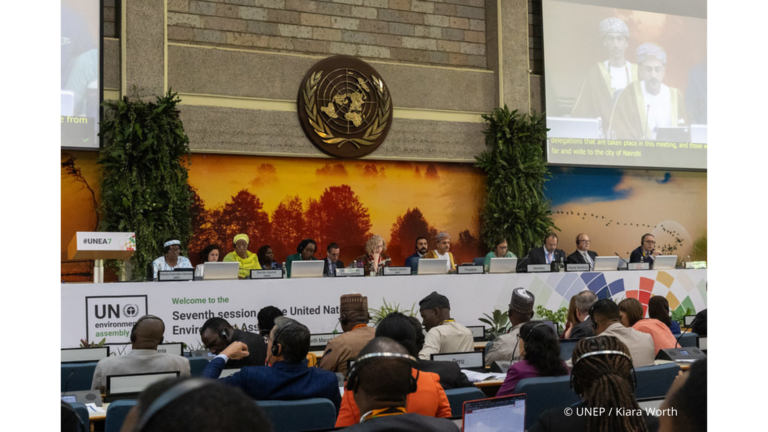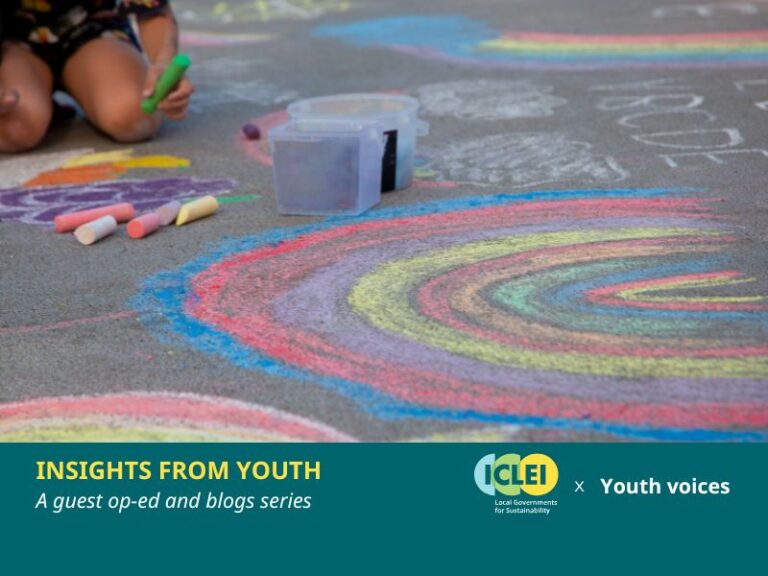From local priorities to youth inclusive NDCs: What should COP30 deliver for youth?
Written by Karishma Asaporta, ICLEI World Secretariat, and Parvathy Sobha*, YOUNGO Cities Working Group.
For young people – and particularly YOUNGO, the official children and youth constituency within the UNFCCC process – COP30 is an opportunity to continue advocating for multi-generational priorities into the proceedings.
Through a collective global process facilitated by the Local Conference of Youth (LCOYs) held in about 110 countries throughout the year, the 2025 Global Youth Statement represents the unified vision and demands of children and young people worldwide, calling for climate justice, resilience, and equity as essential pillars of a livable future. In the spirit of “Harvesting Hope”, and the call for collective mobilisation of the Mutirão every thematic has defined their call to action for Parties at COP30 to accelerate climate action, strengthen multilateralism, and climate justice.
On cities, YOUNGO calls on Parties to strengthen subnational climate action by financing, empowering, and formally integrating local governments and diverse community voices into NDCs, NAPs, and long-term strategies. This includes endorsing and implementing CHAMP, establishing transparent annual reporting mechanisms, and ensuring meaningful inclusion of young people in local decision-making.
YOUNGO also acknowledges the importance of multilevel, multistakeholder initiatives such as Town Hall COPs, LCOYs, and the MAP Declaration, guided by principles of intergenerational justice and CBDR-RC. Furthermore, YOUNGO urges Parties to integrate the Multisectoral Action Pathways (MAP) framework into national climate and development plans, institutionalize MAP within UNFCCC processes, and expand direct grant-based financing for developing-country cities. The MAP framework must prioritize health equity, community awareness, climate-risk education, and the prevention of displacement—especially for the poorest urban residents—while embedding Just Urban Transition and Loss and Damage considerations across all governance levels.
Learning from youth-inclusive NDCs
Recent analyses show that roughly half of updated NDCs include references to youth participation, though fewer specify structured mechanisms for engagement (UNDP & UNICEF Youth Engagement in NDC Processes, 2023 and NDC Partnership 2023).
Countries such as Costa Rica, Ghana, and Fiji have pioneered inclusive approaches by embedding youth consultation and climate education strategies in their national frameworks — demonstrating that participation enhances accountability and innovation.
Lessons from these youth-inclusive NDCs show that early involvement of youth networks fosters innovation, strengthens transparency, and builds long-term climate literacy. Integrating these mechanisms into NDC 3.0 could ensure continuity and accountability across generations.
What’s still missing
Despite these positive trends, there is still no formal requirement for countries to co-develop NDC 3.0 with subnational governments, youth, or Indigenous Peoples. While many NDCs reference youth, few translate this recognition into actionable frameworks or funding mechanisms.
Grassroots and youth-led forums, such as LCOYs, remain outside formal national processes. Integrating their outcomes could make national commitments more grounded and inclusive. Embedding youth leadership through consultative roles, education-to-action pipelines, and access to finance will be essential for equitable implementation.
Youth-focused sessions to look out for in week 2 at the Children and Youth Pavilion:
- 17 Nov, 16:10–16:55: Multilateral Youth Action: Enhancing Climate Resilience across Sectors
- 19 Nov, 13:30–14:15: Co-creating Healthy Towns and Cities for Children and Youth
Entry points for youth priorities: From the SBs to COP30
The Subsidiary Bodies (SBSTA 63 and SBI 63) sessions earlier this year set the stage for COP30 by advancing discussions on several key fronts that directly influence inclusive, multilevel climate governance:
· Adaptation and the Global Goal on Adaptation (GGA): Negotiators continued refining frameworks and indicators to track resilience and equity, consistent with Article 7 of the Paris Agreement. The UNFCCC Adaptation Portal emphasizes that resilience depends on access to finance, inclusion in planning, and active local participation. Addressing loss and damage remains an issue of justice as much as policy. The Santiago Network connects countries and communities with the technical and financial support needed to recover with dignity when disasters strike.
· Loss and Damage: Work under the Warsaw International Mechanism and the Santiago Network reaffirmed the importance of sustained support and technical assistance for communities already experiencing severe climate impacts. The UNFCCC Adaptation Portal emphasizes that resilience depends on access to finance, inclusion in planning, and active local participation. Addressing loss and damage remains an issue of justice as much as policy.
· Non-Market Cooperation (Article 6.8): Countries explored practical avenues for collaboration — focusing on shared knowledge, capacity building, and technology exchange rather than only market-based mechanisms. The UNFCCC Concept Note on Article 6.8 outlines ways to strengthen institutions, enhance engagement with support providers, and showcase examples such as blue carbon ecosystems and disaster risk-transfer tools. These approaches bridge local and global priorities while ensuring participation of youth, Indigenous leaders, and community groups.
· Agriculture and Food Systems: Inputs emphasized locally grounded, nature-based approaches that connect national strategies with community-led adaptation. The agriculture and food systems discussions continue to underscore nature-based solutions, such as restoring ecosystems and improving soil health, to support livelihoods and build long-term resilience. Youth-led farming initiatives, such as those supported through the FAO Youth in Agrifood Systems Programme, demonstrate how intergenerational knowledge strengthens food security and climate-smart livelihoods.
· Participation and Inclusion: The Action for Climate Empowerment (ACE) and Local Communities and Indigenous Peoples Platform (LCIPP) tracks highlighted engagement of youth, Indigenous Peoples, and local actors as central to effective implementation. Youth networks such as YOUNGO and national youth councils are increasingly recognized for shaping adaptation priorities and accountability across levels of governance.
*About the author:
Parvathy Sobha is an energy systems analyst focused on sustainable energy transitions and climate policy. She works as an Energy Expert at IVL, the Swedish Environmental Research Institute, and is pursuing a PhD at Luleå University of Technology. Her research centers on developing energy system models that help national and subnational governments, including municipalities, align their energy and climate strategies with the Paris Agreement and the Sustainable Development Goals. She volunteers with the Working Group on Cities at YOUNGO, the official youth constituency to the UNFCCC, and serves as the Young Energy Ambassador from Sweden to the European Commission for the 2025 to 2026 cohort.
Cover photo: COP30 Youth-led Climate Forum. © UN Climate Change – Diego Herculano.





